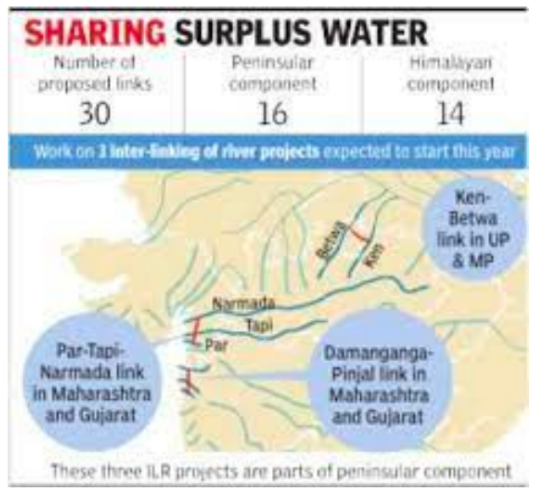Answer:
Approach:
- Introduction: Begin by outlining the core premise of river interlinking in India, establishing its proposed significance in addressing droughts, floods, and navigation issues.
- Body:
- List down the projected benefits, from drought alleviation and flood control to other advantages like enhanced navigation and those mentioned in the National Perspective Plan.
- Discuss the basic concept behind river interlinking, which relies on treating river basins as independent entities, highlighting the theoretical advantages of such an approach.
- Dive into the findings of the recent Nature Communications study. This section will critically examine the previously held assumptions by presenting:
- Observations on modified monsoon patterns due to interlinking.
- The newfound interconnectivity of river basins, disproving the siloed view.
- Broader impacts that go beyond just monsoon patterns, affecting the ecosystem as a whole.
- Summarize the potential negative impacts and implications of the river interlinking projects, underscoring the need for re-evaluation.
- Conclusion: Conclude by emphasizing the importance of a well-rounded understanding of the complex hydro-meteorological systems.
|
Introduction:
The idea of interlinking rivers in India has been proposed as a comprehensive solution to address the concurrent challenges of droughts, floods, and interrupted navigation. The intent behind such a mammoth infrastructural initiative is to divert surplus waters from one river basin to water-deficient areas in another. However, recent studies bring forth some potential negative impacts, which warrant a closer scrutiny.
Body:
Perceived Benefits of River Interlinking:

- Drought Alleviation: Projects like the Ken-Betwa link were promoted as mechanisms to transfer surplus waters, thereby acting as potential saviors for drought-prone regions.
- Flood Control: The interlinking can possibly reduce flood intensity by distributing excess water to regions that need it.
- Enhanced Navigation: A consistent flow of water ensures better navigability of the rivers.
- Other Benefits: The National Perspective Plan (NPP) mentions benefits such as increased irrigated areas, hydropower generation, employment generation, salinity control, and pollution abatement.
The Underlying Assumption:
- The fundamental basis of river interlinking is treating river basins as silos, i.e., their operations won’t significantly affect adjoining basins or the larger ecosystem.
- Water from surplus basins (e.g., Godavari) would be transferred to deficit ones (like Cauvery), assuming it would not flow wastefully into the Arabian Sea or Bay of Bengal. This would theoretically meet India’s escalating water demands.
Challenging the Assumption – Findings from the Nature Communications Study:
- Modified Monsoon Patterns:
- Inter-basin transfers and resultant surplus irrigation have led to changes in summer monsoon patterns.
- For instance, there was a noticeable 12% decrease in mean rainfall in September across already water-stressed arid regions.
- Interconnectivity of River Basins:
- Contrary to the isolated view of river basins, they are found to be interlinked through feedback loops between the land and atmosphere.
- This means a change in one basin could influence neighboring basins.
- For example, changes in the Ganga basin could affect cloud formations over regions surrounding the Mahanadi basin.
- Impact Beyond Monsoons:
- Surplus irrigation led to a decline in soil moisture, resulting in reduced rainfall and increased temperatures across central India, especially noticeable during La Niña years.
- Ecosystem Impact:
- Moving away from natural flow regimes could lead to significant ecological consequences, including effects on aquatic systems and fish diversity.
Critical Implications:
- Altered Hydro-meteorological Systems: The alterations can make the interlinking projects counterproductive, exacerbating water stress.
- Potential Project Redundancy: Reduced precipitation due to modified monsoon patterns might dry rivers post-monsoon, rendering the interlinking efforts ineffective.
Conclusion:
While the idea of river interlinking offers a promising solution to some of India’s pressing water-related challenges, it’s evident that the intricate hydro-meteorological systems and their responses to such interventions need deeper understanding. Ensuring a balance between meeting water demands and maintaining ecological sustainability is crucial. Policymakers must rigorously evaluate the potential long-term impacts of such projects, ensuring that today’s solutions don’t become tomorrow’s problems.
To get PDF version, Please click on "Print PDF" button.



https://uploads.disquscdn.com/images/b4f8411329659c8b9651b995572fd51d9b4ff85ef71b85545f1c1bb6075f64d0.jpg https://uploads.disquscdn.com/images/a5d10315f656c0b3f2b777d634a071eb275ee1b6dedfbd92eead56d2fe9965f1.jpg https://uploads.disquscdn.com/images/8d5efc6915d16cd26eba3f84d5dfcbb43c4e62297e33710e24d256b3e4c5a0bc.jpg
https://uploads.disquscdn.com/images/7106579a1e9748227b4ce9d774dc2ad598a0f29e31f9f3cedf5ed05a1fd5f865.jpg https://uploads.disquscdn.com/images/4b878b61eba68c4cba2e4bd9316e3de00526b4afd69da9c82ed15453467cb0dc.jpg https://uploads.disquscdn.com/images/673699a166ba7a1fbc88235af3081ff874e48992e8a3a3a6eed6ddfb9efd7931.jpg
https://uploads.disquscdn.com/images/c3d9043a23bdeb0291b55b8927a583ca7e289e695b30e5d984e3ff6b71e88bb6.jpg https://uploads.disquscdn.com/images/eaf69bf68fbbf1f8f6d8be7c9f213d0e49d9dbbcdef76bbacdf11e1df805e211.jpg https://uploads.disquscdn.com/images/66cec494a03ac6f713f2c3b918784fb92509ad5cf356113ef0b9dc58a8e3546f.jpg
https://uploads.disquscdn.com/images/1c502a4c2060d5de6b45fedf61f7d6559e22b2bf68d4e0832397874513df9d48.jpg https://uploads.disquscdn.com/images/515bb31877b94c6ef501652b49dd486d0a94533e2514fec348237f21c61ddd33.jpg https://uploads.disquscdn.com/images/59a155c0f0701ff1a5e7395c82ea4e4da86eb616c53134d47bd57d06b8ac035d.jpg
https://uploads.disquscdn.com/images/9ef391ac1400b2da61e3d4c3469fa1298af784067dd7af48a7866a4580a4bc03.jpg
https://uploads.disquscdn.com/images/002010e2a1fe4aedb8c227d51669d20d49f3abbf59efaf268c126eb2042bf6fa.jpg
https://uploads.disquscdn.com/images/ef341eab54ad0762dcf073ae67e2069cbcaf915cd4737ff99e11e92f8cc4baa8.jpg
https://uploads.disquscdn.com/images/ecf5224061a06cc5fc03d13e2ecffed6aa715932aa4c97a66ba76192026fb451.jpg https://uploads.disquscdn.com/images/372b566ca18304168c05d03df7194e5bf2edbc1d96bcdb1bd2389cc74a7ed1fd.jpg https://uploads.disquscdn.com/images/7fd10aa322679530e0cc5a827b7026ee1b97d8f0081ee3a200bfe5dc2bf15cc7.jpg
https://uploads.disquscdn.com/images/336fa524b81aedf96ec0fcae6b2f50adb4ef0d9a54c58c3eb7a6a7dcfa6b0804.jpg https://uploads.disquscdn.com/images/f41b83e76ccfa600251652a9f0f8f509ded0efca73abb4834001a560ebaf8804.jpg https://uploads.disquscdn.com/images/e2cd2478ccfcdeb36c140ae4a55febcf3ec67a96b650b8fc1daa8351446d64e2.jpg
https://uploads.disquscdn.com/images/78f8fc98e36ac65ab268f7c271178ce34a7f5619f6761253217546e88e4d16c7.jpg https://uploads.disquscdn.com/images/ed7e1de91f0d27281ca71c3681158dcc756e7a6b991646e6f4542be704403ae0.jpg https://uploads.disquscdn.com/images/79c1f74588e86ad63fe3317ab31888db2622c29c14df369e6644e9541e39993a.jpg